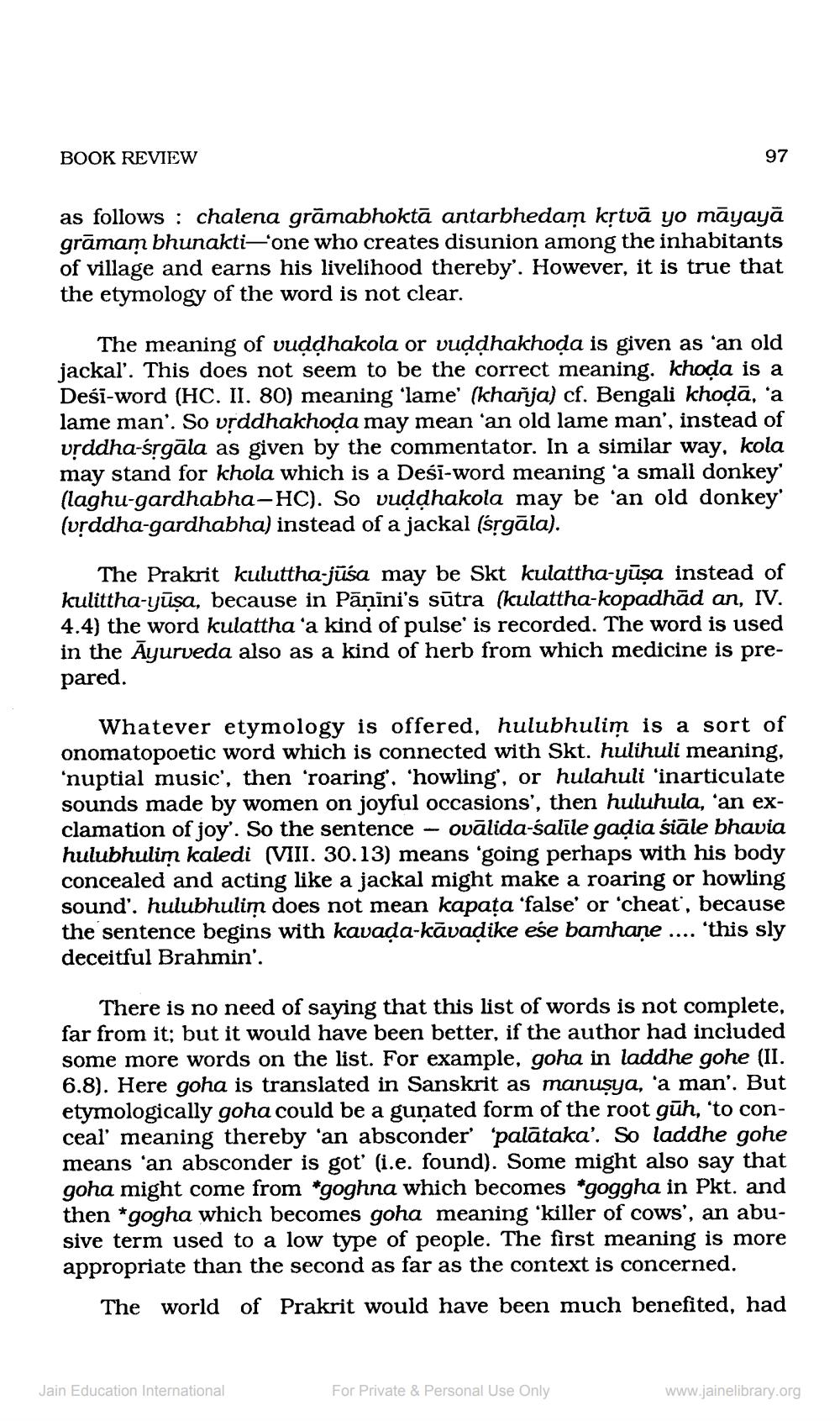Book Title: Jain Journal 1996 01 Author(s): Jain Bhawan Publication Publisher: Jain Bhawan Publication View full book textPage 8
________________ BOOK REVIEW 97 as follows : chalena grāmabhoktā antarbhedam krtvā yo māyayā grāmam bhunakti—one who creates disunion among the inhabitants of village and earns his livelihood thereby'. However, it is true that the etymology of the word is not clear. The meaning of vuddhakola or vuddhakhoda is given as 'an old jackal'. This does not seem to be the correct meaning. khoda is a Deśī-word (HC. II. 80) meaning 'lame' (khañja) cf. Bengali khoạā, 'a lame man'. So vệddhakhoda may mean ‘an old lame man', instead of vsddha-śrgāla as given by the commentator. In a similar way, kola may stand for khola which is a Deś7-word meaning 'a small donkey (laghu-gardhabha-HC). So vuddhakola may be 'an old donkey (usddha-gardhabha) instead of a jackal (śrgāla). The Prakrit kuluttha-jūša may be Skt kulattha-yūṣa instead of kulittha-yūşa, because in Pāṇini's sūtra (kulattha-kopadhād an, IV. 4.4) the word kulattha ‘a kind of pulse' is recorded. The word is used in the Ayurveda also as a kind of herb from which medicine is prepared. Whatever etymology is offered, hulubhulim is a sort of onomatopoetic word which is connected with Skt. hulihuli meaning, ‘nuptial music', then 'roaring'. 'howling", or hulahuli 'inarticulate sounds made by women on joyful occasions', then huluhula, 'an exclamation of joy'. So the sentence - ovālida-salile gadia śiāle bhavia hulubhulim kaledi (VIII. 30.13) means 'going perhaps with his body concealed and acting like a jackal might make a roaring or howling sound'. hulubhulim does not mean kapata 'false' or 'cheat', because the sentence begins with kavada-kāvaţike ese bamhane .... 'this sly deceitful Brahmin'. There is no need of saying that this list of words is not complete, far from it; but it would have been better, if the author had included some more words on the list. For example, goha in laddhe gohe (II. 6.8). Here goha is translated in Sanskrit as manusya, 'a man'. But etymologically goha could be a gunated form of the root gūh, 'to conceal meaning thereby 'an absconder' 'palātaka'. So laddhe gohe means 'an absconder is got' (i.e. found). Some might also say that goha might come from *goghna which becomes *goggha in Pkt. and then *gogha which becomes goha meaning ‘killer of cows', an abusive term used to a low type of people. The first meaning is more appropriate than the second as far as the context is concerned. The world of Prakrit would have been much benefited, had Jain Education International For Private & Personal Use Only www.jainelibrary.orgPage Navigation
1 ... 6 7 8 9 10 11 12 13 14 15 16 17 18 19 20 21 22 23 24 25 26 27 28 29 30 31
